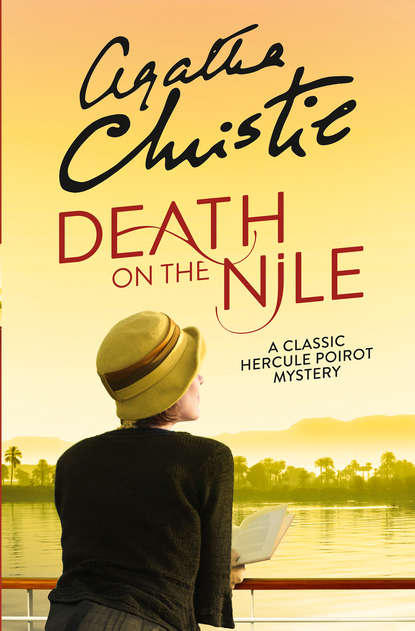По всем вопросам обращайтесь на: info@litportal.ru
(©) 2003-2025.
✖
Death on the Nile
Автор
Год написания книги
2019
Настройки чтения
Размер шрифта
Высота строк
Поля
‘I know. It’s awful, isn’t it? This love business gets hold of you and you can’t do anything about it.’
She paused for a minute. Her dark eyes dilated, looked suddenly tragic. She gave a little shiver.
‘It’s–even frightening sometimes! Simon and I were made for each other. I shall never care for anyone else. And you’ve got to help us, Linnet. I heard you’d bought this place and it put an idea into my head. Listen, you’ll have to have a land agent–perhaps two. I want you to give the job to Simon.’
‘Oh!’ Linnet was startled.
Jacqueline rushed on: ‘He’s got all that sort of thing at his fingertips. He knows all about estates–was brought up on one. And he’s got his business training too. Oh, Linnet, you will give him a job, won’t you, for love of me? If he doesn’t make good, sack him. But he will. And we can live in a little house, and I shall see lots of you, and everything in the garden will be too, too divine.’
She got up.
‘Say you will, Linnet. Say you will. Beautiful Linnet! Tall golden Linnet! My own very special Linnet! Say you will!’
‘Jackie–’
‘You will?’
Linnet burst out laughing.
‘Ridiculous Jackie! Bring along your young man and let me have a look at him and we’ll talk it over.’
Jackie darted at her, kissing her exuberantly.
‘Darling Linnet–you’re a real friend! I knew you were. You wouldn’t let me down–ever. You’re just the loveliest thing in the world. Goodbye.’
‘But, Jackie, you’re staying.’
‘Me? No, I’m not. I’m going back to London, and tomorrow I’ll come back and bring Simon and we’ll settle it all up. You’ll adore him. He really is a pet.’
‘But can’t you wait and just have tea?’
‘No, I can’t wait, Linnet. I’m too excited. I must get back and tell Simon. I know I’m mad, darling, but I can’t help it. Marriage will cure me, I expect. It always seems to have a very sobering effect on people.’
She turned at the door, stood a moment, then rushed back for a last quick birdlike embrace.
‘Dear Linnet–there’s no one like you.’
VI
M. Gaston Blondin, the proprietor of that modish little restaurant Chez Ma Tante, was not a man who delighted to honour many of his clientèle. The rich, the beautiful, the notorious, and the well-born might wait in vain to be singled out and paid special attention. Only in the rarest cases did M. Blondin, with gracious condescension, greet a guest, accompany him to a privileged table, and exchange with him suitable and apposite remarks.
On this particular night, M. Blondin had exercised his royal prerogative three times–once for a Duchess, once for a famous racing peer, and once for a little man of comical appearance with immense black moustaches, who, a casual onlooker would have thought, could bestow no favour on Chez Ma Tante by his presence there.
M. Blondin, however, was positively fulsome in his attentions. Though clients had been told for the last half hour that a table was not to be had, one now mysteriously appeared, placed in a most favourable position. M. Blondin conducted the client to it with every appearance of empressement.
‘But naturally, for you there is always a table, Monsieur Poirot! How I wish that you would honour us oftener!’
Hercule Poirot smiled, remembering that past incident wherein a dead body, a waiter, M. Blondin, and a very lovely lady had played a part.
‘You are too amiable, Monsieur Blondin,’ he said.
‘And you are alone, Monsieur Poirot?’
‘Yes, I am alone.’
‘Oh, well, Jules here will compose for you a little meal that will be a poem–positively a poem! Women, however charming, have this disadvantage: they distract the mind from food! You will enjoy your dinner, Monsieur Poirot; I promise you that. Now as to wine–’
A technical conversation ensued, Jules, the maître d’hotel, assisting.
Before departing, M. Blondin lingered a moment, lowering his voice confidentially.
‘You have grave affairs on hand?’
Poirot shook his head.
‘I am, alas, a man of leisure,’ he said softly. ‘I have made the economies in my time and I have now the means to enjoy the life of idleness.’
‘I envy you.’
‘No, no, you would be unwise to do so. I can assure you, it is not so gay as it sounds.’ He sighed. ‘How true is the saying that man was forced to invent work in order to escape the strain of having to think.’
M. Blondin threw up his hands.
‘But there is so much! There is travel!’
‘Yes, there is travel. Already I have not done so badly. This winter I shall visit Egypt, I think. The climate, they say, is superb! One will escape from the fogs, the greyness, the monotony of the constantly falling rain.’
‘Ah! Egypt,’ breathed M. Blondin.
‘One can even voyage there now, I believe, by train, escaping all sea travel except the Channel.’
‘Ah, the sea, it does not agree with you?’
Hercule Poirot shook his head and shuddered slightly.
‘I, too,’ said M. Blondin with sympathy. ‘Curious the effect it has upon the stomach.’
‘But only upon certain stomachs! There are people on whom the motion makes no impression whatever. They actually enjoy it!’
‘An unfairness of the good God,’ said M. Blondin.
He shook his head sadly, and, brooding on the impious thought, withdrew.
Smooth-footed, deft-handed waiters ministered to the table. Toast Melba, butter, an ice pail, all the adjuncts to a meal of quality.
The Negro orchestra broke into an ecstasy of strange discordant noises. London danced.
Hercule Poirot looked on, registered impressions in his neat orderly mind.

















